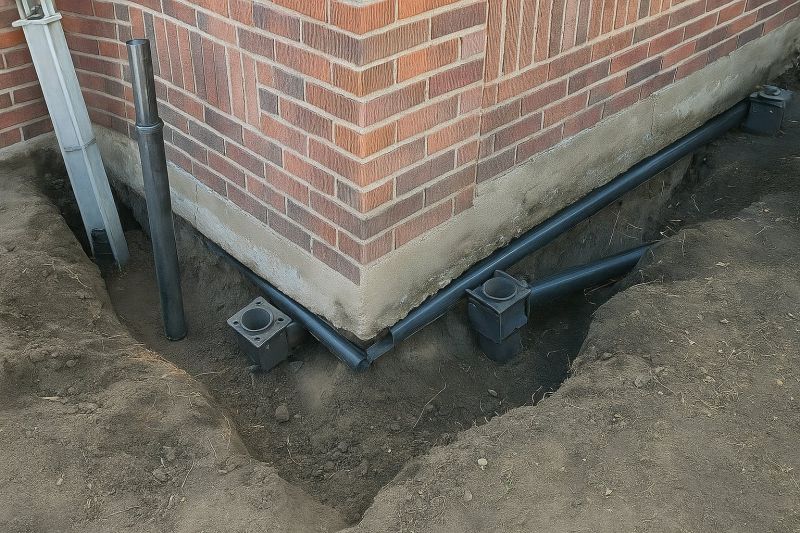Popular Helical Piles Installation Products for Professionals
Discover essential products trusted by industry experts to ensure secure and durable helical pile setups in complex foundation projects.
 Products for helical pile installations encompass a variety of tools and accessories designed to facilitate the secure anchoring of structures into the ground. These products are essential for ensuring stability in construction, landscaping, and renovation projects that require deep foundation support. The core components include different types of helical piles, installation equipment, and specialized accessories that enhance the efficiency and safety of the process.
Products for helical pile installations encompass a variety of tools and accessories designed to facilitate the secure anchoring of structures into the ground. These products are essential for ensuring stability in construction, landscaping, and renovation projects that require deep foundation support. The core components include different types of helical piles, installation equipment, and specialized accessories that enhance the efficiency and safety of the process.
Top Overall Option
Heavy-Duty Hydraulic Torque Motor
A robust hydraulic torque motor is considered a versatile choice for installing helical piles, offering high torque output and compatibility with various pile sizes. Its ease of operation and ability to handle demanding projects make it a popular option among professionals. This equipment ensures efficient and controlled installation, reducing manual effort and increasing precision.
Types of Products For Helical Piles Installations
Standard Helical Piles
Steel shafts with helical plates designed for general foundation support in various soil conditions.
Extension Shafts
Additional length components used to reach deeper soil layers during installation.
Hydraulic Torque Motors
Powerful tools that provide the torque needed to screw piles into the ground efficiently.
Pile Adapters and Connectors
Accessories that facilitate the connection between different pile sections or equipment.
Vibration Dampers
Devices that reduce vibrations during installation, protecting surrounding structures and equipment.
Manual Handheld Drivers
Portable tools suitable for small-scale or precision installations where motorized equipment isn't practical.
Soil Testing Equipment
Tools used to assess soil conditions prior to installation, ensuring optimal product selection.
Corrosion-Resistant Pile Coatings
Protective coatings that extend the lifespan of piles in corrosive environments.
Pile Driving Helmets and Safety Gear
Essential safety equipment for operators during installation to ensure safety compliance.
Pile Pullers and Extractors
Tools designed for removing or adjusting piles after installation if needed.
Popular Choices
Widely used for its power and efficiency in various helical pile projects.
Commonly selected for diverse foundation applications across soil types.
Frequently used to adapt piles to deeper soil layers or specific project depths.
Popular for reducing installation vibrations and protecting nearby structures.
Preferred for small projects or where portability is essential.
Essential for customizing pile configurations and ensuring compatibility.
Chosen for extending the durability of piles in challenging environments.
Important for ensuring proper pile selection and installation planning.
Useful for adjusting or removing piles when necessary.
Commonly used safety equipment during pile installation activities.
Helical piles, also known as screw piles, are steel shafts with helical plates that enable easy rotation into the soil. They are valued for their versatility across soil types and their capacity to be installed with minimal disturbance to the surrounding environment. The installation process typically involves specialized machinery such as hydraulic torque motors, which provide the necessary torque to turn the piles into the ground. Accessories like extension shafts, adapters, and vibration dampers are often used to adapt the piles to specific project requirements.
Choosing the right products for helical pile installation depends on various factors, including soil conditions, load requirements, and project scale. Proper selection of equipment and accessories can influence the overall stability, longevity, and safety of the structure. It is important to consider the compatibility of components, ease of use, and durability when selecting products for installation tasks. Investing in quality tools and accessories can contribute to smoother operations and more reliable foundation support.
Whether for residential, commercial, or industrial applications, a wide range of products exists to meet different needs. From lightweight manual tools suitable for small projects to heavy-duty hydraulic systems designed for large-scale construction, the options are extensive. Understanding the features and specifications of these products can help users make informed decisions that align with their project goals and constraints.
Key Buying Considerations
- Soil Type Compatibility: Ensure the products are suitable for the specific soil conditions at the site.
- Load Capacity: Match the product's load ratings with the structural requirements of your project.
- Material Durability: Opt for corrosion-resistant materials if installation is in challenging environments.
- Equipment Compatibility: Confirm that accessories and tools are compatible with the pile sizes and types used.
- Ease of Use: Consider products that are user-friendly and suitable for your skill level or team expertise.
- Power Source: Decide between manual, hydraulic, or electric tools based on project scale and accessibility.
- Safety Features: Prioritize products with safety features or protective accessories to ensure safe operation.
- Installation Speed: Select tools that can improve efficiency without compromising safety or quality.
- Portability: For small or remote projects, lightweight and portable equipment may be advantageous.
- Cost and Budget: Balance quality and features with your budget constraints, avoiding overly cheap options that may lack durability.
- Brand Reputation and Support: Choose products from reputable sources that offer good customer support and warranty.
- Environmental Conditions: Consider weather resistance and operational limits under specific environmental factors.
- Accessibility: Ensure that the necessary tools and accessories are readily available or easy to source.
- Project Scale: Match the product size and capacity to the scope of your installation project.
- Regulatory Compliance: Verify that the equipment meets relevant safety and industry standards.
This content may contain affiliate links. We may earn a commission if you make a purchase through these links, at no additional cost to you.
